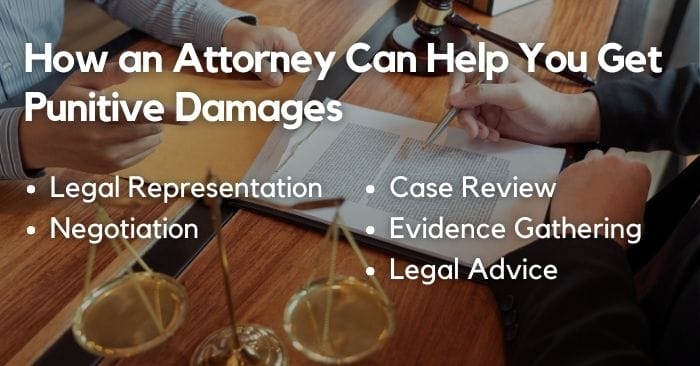
How to Calculate Punitive Damages in California
Legally reviewed by: Jessica Anvar Stotz, JD, MBA
Punitive damages generally serve as a financial deterrent to prevent egregious behavior. In California, the calculation of these damages involves a nuanced understanding of the state’s legal landscape and a careful consideration of several different elements. One of the best ways to calculate punitive damages in California is by considering several key factors such as:
- Type of Action and Defendant’s Motivation: The nature of the defendant’s wrongful act and their motivation for committing it are both considered.
- Proportionality to Compensatory Damages: Punitive damages must be proportionate to the compensatory damages awarded. One common limitation is that they cannot exceed four times the amount of compensatory damages.
- Defendant’s Financial Status: California courts must review evidence of a defendant’s financial status before awarding punitive damages. This ensures that the defendant won’t be financially crippled by such an award.
- Maximum Limit: California courts can generally award punitive damages in any amount that does not exceed nine times the total amount of compensatory damages awarded to the plaintiff.
Legal Process for Seeking Punitive Damages
| Steps in the Legal Process for Seeking Punitive Damages | Description |
| Filing a Lawsuit | Plaintiff initiates legal action alleging malicious, oppressive, or fraudulent conduct by the defendant. |
| Bifurcated Trial | Trial is divided into two phases: liability and damages. |
| Liability Phase | Jury determines defendant’s liability and malicious conduct. |
| Damages Phase | If liable, the same jury determines compensatory and punitive damages. |
| Evidence of Financial Status | Courts review defendant’s financial status before awarding punitive damages. |
| Awarding of Punitive Damages | If awarded, the amount should not exceed nine times compensatory damages. |
Note that there is no fixed standard to determine the amount of punitive damages in a personal injury case in California. If a defendant must pay punitive damages, the amount is often determined by a number multiplier that increases with the reprehensibility of the defendant’s conduct.
Ways to Calculate Punitive Damages in California
Courts will typically look at factors such as the wealth or valuation of the defendant, the egregiousness of the harm suffered by the plaintiff, and the amount of compensatory damages awarded to the plaintiff when determining a punitive damages award.
Factors Considered in the Calculation
Courts may consider,
- Severity of the Wrongdoing: The more severe the defendant’s misconduct, the higher the punitive damages may be. This is to ensure that the punishment fits the crime and serves as an effective deterrent.
- Defendant’s Attitude and Conduct: The court will consider the defendant’s attitude and conduct during the proceedings. If the defendant shows remorse and takes steps to rectify the harm they caused, the court may award lower punitive damages.
- Potential Damage: Sometimes, the potential harm caused by the defendant’s actions might have been much greater than the actual harm. In such cases, the court may award higher punitive damages to deter similar conduct in the future.
- Profitability: If the wrongful conduct was profitable to the defendant, the court might award higher punitive damages to eliminate the benefits derived from the misconduct.
- Repeated Actions: If the defendant has a history of similar misconduct, the court may increase the punitive damages to deter repeat behavior.
- Financial Condition of the Defendant: The wealthier the defendant, the larger the punitive damages may need to be in order to serve as an effective deterrent.
Remember, the goal of punitive damages is not just to punish the defendant, but also to deter similar conduct in the future.
What to Know if You Don’t Know the Legal Definition of Punitive Damages in California
Punitive damages, also referred to as “exemplary” damages in California, are a form of punishment against a defendant for certain wrongful acts. Unlike compensatory damages, which aim to repay the plaintiff for harm suffered, punitive damages are imposed by a judge or jury to punish the defendant for behavior deemed abhorrent and unacceptable. Punitive damages are used to deter such behavior in the future by the defendant or others who learn of the award.
Criteria That Must Be Met to Award Punitive Damages
Punitive damages are awarded in extreme cases where the defendant’s conduct goes beyond negligence and shows a conscious disregard for others’ safety. The evidence in these cases needs to be unambiguous and usually supported by several witnesses and/or a criminal conviction.
According to the California Civil Code, section 3294, punitive damages are available to plaintiffs who can show that a defendant acted with “oppression, fraud, or malice” toward the plaintiff, in any claim that does not stem from a breach of contract. In addition to these criteria, the plaintiff must also demonstrate that the defendant’s actions were intentional and purposeful. This means that the defendant knew their actions were likely to cause harm but chose to proceed regardless.
Furthermore, the plaintiff must also provide clear and convincing evidence of the defendant’s malice, oppression, or fraud. This is a higher standard of proof than the “preponderance of the evidence” typically required in civil cases. Lastly, the court must find that the amount of punitive damages awarded is reasonable in relation to the harm caused by the defendant’s actions. This is to ensure that the punitive damages serve their purpose of punishment and deterrence, without being excessive or unjust.
Limits on Punitive Damages
Before awarding punitive damages, California courts must review evidence of a defendant’s financial status. This is to ensure that the defendant won’t be financially crippled by such an award, as the principle behind punitive damages is to prevent bad behavior in the future, not to ruin the defendant entirely.
California courts can award punitive damages in any amount that does not exceed nine times the total amount of compensatory damages awarded to the plaintiff. Factors such as the wealth or valuation of the defendant, the egregiousness of the harm suffered by the plaintiff, and the amount of compensatory damages awarded to the plaintiff are considered when determining a punitive damages award.
Legal Process for Seeking Punitive Damages
The process for seeking punitive damages in California involves several key steps:
- Filing a Lawsuit: The plaintiff initiates the process by filing a lawsuit against the defendant, alleging that the defendant’s actions were not just negligent, but also malicious, oppressive, or fraudulent.
- Bifurcated Trial: Typically, trials in which a plaintiff seeks punitive damages are bifurcated. This means the trial divides into two parts: the liability phase and the damages phase.
- Liability Phase: In the liability phase, the jury determines whether the defendant is liable for the plaintiff’s harm and whether the defendant’s conduct was malicious, oppressive, or fraudulent.
- Damages Phase: If the defendant is found liable for oppression, fraud, or malice in the liability phase, the same jury hears the damages phase. In this phase, the jury determines the amount of compensatory damages and whether punitive damages should be awarded.
- Evidence of Financial Status: Before awarding punitive damages, California courts must review evidence of a defendant’s financial status. This allows the court to ensure that the defendant won’t be financially crippled by such an award.
- Awarding of Punitive Damages: If the court decides to award punitive damages, the amount must not exceed nine times the total amount of compensatory damages awarded to the plaintiff.
The burden of proof is on the plaintiff to demonstrate with clear and convincing evidence that the defendant acted with malice, oppression, or fraud. This is a higher standard of proof than the “preponderance of the evidence” typically required in civil cases.
Does a Jury Have a Say in Who Gets Punitive Damages?
Yes, a jury does have a say in who gets punitive damages. In most states, including California, the decision to award punitive damages and the amount of those damages may be at the discretion of the judge or jury in a case.

How an Attorney Can Help You Get Punitive Damages
An attorney plays a crucial role in helping you seek punitive damages. Here’s how:
- Case Review: An attorney can review your case, advise you on the laws of your state, and assist you with filing a claim for punitive damages.
- Evidence Gathering: Your attorney can help you begin gathering evidence so you can prove liability and the extent of loss. Providing proof that the defendant was at fault and caused you serious damage helps maximize your compensation.
- Legal Advice: An experienced lawyer can provide legal advice and help you determine if you have grounds for punitive damages. They can guide you through the complexities of the legal system and ensure you understand your rights and options.
- Representation in Court: If your case goes to trial, your attorney will represent you in court, presenting your case in the most compelling way possible.
- Negotiation: If there’s an opportunity to settle the case outside of court, your attorney can negotiate with the defendant’s legal team to ensure you receive a fair settlement.
- Maximizing Compensation: Punitive damages are more complex and difficult to get than compensatory damages. An experienced attorney can help you navigate these complexities and work to maximize the compensation you receive.
Enlisting the assistance of a lawyer helps ensure you receive the compensation you deserve for your injuries. Their expertise and guidance can be invaluable in helping you navigate the legal process and achieve a favorable outcome.
Connect With a Lawyer
If you believe you have a case that may warrant punitive damages, LawLinq, a lawyer referral service based in California, is here to help. Our team at LawLinq can connect you with leading personal injury attorneys who specialize in cases like yours. They can provide you with the legal advice and representation you need to achieve the best case results possible. Contact LawLinq to learn more about your options today.


